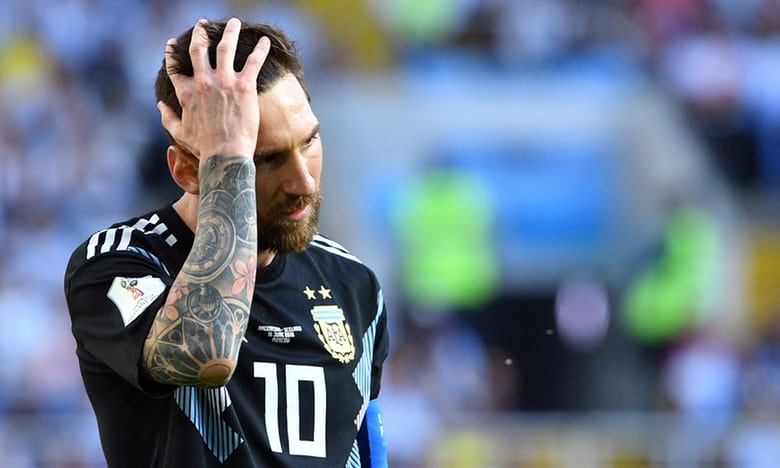|
Bad timing by Leo. On the day after Cristiano Ronaldo made three goals to draw against Spain, Messi had to take a penalty kick against Iceland, the smallest nation ever to play in the World Cup.
It was the same day that my friend Jeffrey Marcus, in his World Cup site called The Banter, picked up an article from Bleacher Report that explained http://bleacherreport.com/articles/2764081-why-leo-messi-is-so-good-at-free-kicks-but-so-average-at-penalties. It was only a few days since I was questioned by the son of an American friend now living overseas about my general feeling that Messi is not the great transforming player like, well, I could name Ronaldo or Maradona or Zidane. All that was floating around Sparta Stadium in Moscow when Messi stepped up to take a penalty in the 64th minute. Wearing his lime-green shoes and his humble stare, he plopped the ball well within range of the Iceland keeper, who swatted it away. Everybody – the fans, the American broadcasters, and chubby old Diego Armando Maradona, holding a cigar in the stands – knew the deal. Leon is 30. (Of course, Ronaldo is 34.) Maradona would have done something. Feigned a cyber-attack by Iceland. Fell clutching various parts of his body. Demanded a do-over. Punched the ball -- harder now with the unobtrusive and useful VAR instant replay. Messi is a beautiful player and strategist, gliding through traffic, seeing the flow, emerging from nowhere to uncoil like some exotic tropical serpent. But from the penalty line, not so great. Other great players have hated to take penalties – Roberto Baggio and Mia Hamm, to name two. In the soon-to-be-discarded four-team group format, Argentina lives, and so does Iceland, which has a magnificent point from its first World Cup match, ever. Its players were sturdy and intelligent and incessant, schooled in the leagues of Europe. Argentina has had bad openers before. A leaper from Cameroon beat them in the first match, as defending champions, in 1990. But they mauled and clawed and dove their way to the final, anyway. The World Cup is a long haul. The first match, the group stage, a familiar pace, is for charming outsiders, while superstars struggle to establish themselves. I stand by my evaluation of Messi a week or two ago. Onward.
John McDermott
6/16/2018 12:10:41 pm
Spain outplayed Portugal last night. But Ronaldo carried what is a decent but not special Portugal team to a higher level and an important result. Messi today did very little, and when he should have put away a simple penalty kick to win the game he choked and placed the ball within easy reach of the Iceland goalkeeper. Messi is a brilliant player. Just not today. This result could come back to haunt Argentina. I could see Iceland or Croatia winning this group with Argentina fighting for second place. That said, remember how many times Italy went on to play in the Final-and even win the World Cup twice-after struggling to get through a dismal the first round.
Mendel
6/17/2018 01:00:31 am
Your overseas friend, and his son, are without rebuttal for now. Time will tell.
AndyTansey
6/17/2018 12:50:16 pm
There's a man who posts intelligently about soccer here, a former goalkeeper (Jamaica? Hofstra?) who still teaches kids. I am sorry I am unable to remember his name and too lazy to look.
George
6/17/2018 05:26:31 pm
Andy, thanks so much. That would be Alan Rubin, ex-keeper for Lehigh, still teaching his craft to youngsters. GV
Brian Savin
6/18/2018 08:01:32 am
Well, there goes the Altice endorsement contract. Not sure his tattoos work so well in underwear in comparison to Rinaldo's current add, anyway.) 6/18/2018 10:34:13 am
Messi also hit the wall on most, if not all of his free kicks. He is terrific when he moves, creates space, draws defenders and opens opportunities for teammates. However, he seems to have difficulty with initiating a set piece. Comments are closed.
|
Categories
All
|










